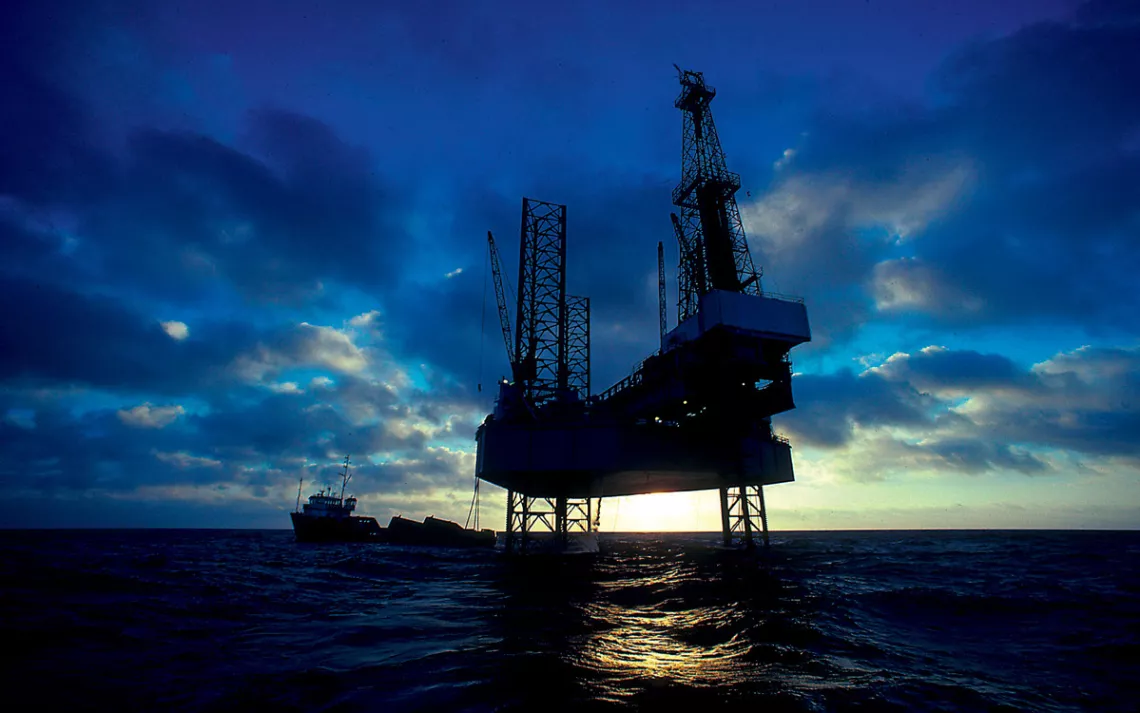Refineries on the Gulf Coast Are Accidents Waiting to Happen
The petrochemical industry is woefully unprepared to handle hurricanes

An oil and gas jackup drilling rig in the Gulf of Mexico | Photo by Universal Images Group/Getty Images
ON SEPTEMBER 3, 2017, shortly after the storm clouds from Hurricane Harvey departed East Texas, Scott Eustis, a wetlands ecologist with the New Orleans–based Gulf Restoration Network, hitched a ride on a plane stuffed with diapers, bottled water, and first-aid kits. The volunteers on board were delivering emergency supplies to hurricane victims. Eustis was scouting for oil and chemical spills.
The flooding had receded from its peak a few days earlier, but torrents of water were still flowing through the ExxonMobil refinery in Beaumont, Texas. From news reports, Eustis knew that sulfur dioxide had been released into the air when the facility was shut down the week before. But flying over the Neches River, along which the refinery is located, he observed a massive oil slick as well. "The whole river was gray with oil," he says.
In an article published by the Beaumont Enterprise, an ExxonMobil representative acknowledged the sheen and said that the company had taken steps to contain it but that the exact source of the oil was unknown. "There are hundreds of facilities and thousands of oil wells, pipelines, and interconnection points that could leak or break," Eustis says. "When the entire river is covered in oil, it's almost impossible to attribute it to one company or another. The government doesn't have the manpower to police these things, especially during a disaster."
On the eve of the storm, Texas governor Greg Abbott had temporarily waived reporting and response requirements for dozens of state pollution laws. That waiver, coupled with the sheer volume of storm-related spills, made it difficult to assess the full extent of the environmental damage from Harvey. What is known is that 6 million pounds of benzene, toluene, and other chemicals were released into the air, and 31 million gallons of raw sewage and at least 700,000 gallons of oil and other pollutants were spilled. More than 650 energy and industrial facilities were flooded, including 13 Superfund sites.
"This is just the tip of the iceberg," says Ilan Levin, associate director of the Environmental Integrity Project. "It will be months or years before we know the extent of the petrochemical substances that have leaked into the soil and water, if ever."
The 2017 hurricane season—in which September was the most active month of any Atlantic hurricane season on record—threw into sharp relief the implications of concentrating the nation's petrochemical infrastructure in such a hurricane-prone region. The Gulf of Mexico produces 17 percent of the nation's crude oil. Roughly half of the nation's petroleum and natural gas is refined on the Gulf Coast. Spills, leaks, and explosions are an issue anywhere that the oil and gas industry operates. But on the Gulf Coast, the impacts of high winds, storm surges, and recurrent flooding compound these risks.
While urban development in the region is often sequestered behind 10-to-15-foot-tall levees and floodwalls, oil, gas, and petrochemical facilities are allowed to be far more exposed. "You can't get mortgage insurance for a home unless it's out of the 100-year floodplain," Eustis says. "But most [petrochemical] facilities are only required to withstand a 25-year-flood event." Harvey was considered a 1,000-year-flood event; other parts of the Gulf Coast have seen multiple 100- and 500-year floods over the last several years.
But wouldn't the industry want to protect its infrastructure from storms, if only for economic reasons? The financial repercussions of storm damage for oil companies are minimal compared with the companies' profits, Eustis says. Ultimately, storm risk is built into their budgets, the cleanup costs covered by a combination of insurance payouts, price increases at the pump, and taxpayer dollars. The prevailing attitude is one of reacting to storms rather than preparing for them.
As destructive as Harvey was, it could have been worse—most of the damage was caused by rain, not by high winds or storm surges. As a result of Hurricane Katrina, which created a 28-foot storm surge in some places, 7 to 9 million gallons of crude oil spilled from damaged pipelines and drilling platforms, nearly as much as the 1989 Exxon Valdez spill in Alaska. Modeling by the Severe Storm Prediction, Education, and Evacuation from Disasters Center at Rice University shows that a Category 4 hurricane, if it entered the Houston Ship Channel head on, would send a 25-to-30-foot wall of water crashing over the levees. At least 200 petrochemical storage tanks are located in the area. An estimated 100 million gallons of petrochemicals could be spilled.
Rather than prepare for a future in which storms and hurricanes increase in number and intensity, the Trump administration is taking steps to ease existing protections. In January, the Interior Department pledged to open nearly all U.S. coastal waters to offshore oil drilling. Accompanying that announcement was a proposal to roll back oil rig safety regulations that were instituted following the 2010 Deepwater Horizon disaster. Discarding those rules would save the oil and gas industry a mere $23 million annually.
As the 2018 hurricane season approaches, Eustis says, mechanisms to hold corporate players liable—not just for cleanup but also for installing the infrastructure to prevent storm damage—are desperately needed. "Allowing them to build to such low standards is just another way we subsidize the oil industry. It's beyond poor planning—it's planned unpreparedness."
This article appeared in the May/June 2018 edition with the headline "Accidents Waiting to Happen."
 The Magazine of The Sierra Club
The Magazine of The Sierra Club



